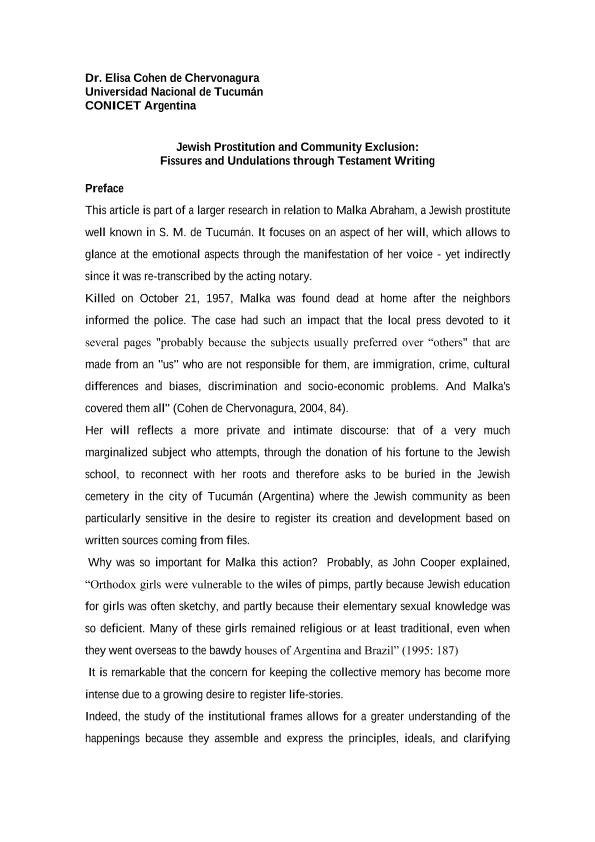Artículo
Jewish Prostitution and Community Exclusion: Fissures and Undulations through Testament Writing
Fecha de publicación:
01/2012
Editorial:
Youngstown State University
Revista:
Journal of Jewish Identities
ISSN:
1946-2522
Idioma:
Inglés
Tipo de recurso:
Artículo publicado
Clasificación temática:
Resumen
This article is part of a larger research in relation to Malka Abraham, a Jewish prostitute well known in S. M. de Tucumán. It focuses on an aspect of her will, which allows to glance at the emotional aspects through the manifestation of her voice - yet indirectly since it was re-transcribed by the acting notary. Killed on October 21, 1957, Malka was found dead at home after the neighbors informed the police. The case had such an impact that the local press devoted to it several pages "probably because the subjects usually preferred over "others" that are made from an "us" who are not responsible for them, are immigration, crime, cultural differences and biases, discrimination and socio-economic problems. And Malka´s covered them all" (Cohen de Chervonagura, 2004, 84). Her will reflects a more private and intimate discourse: that of a very much marginalized subject who attempts, through the donation of his fortune to the Jewish school, to reconnect with her roots and therefore asks to be buried in the Jewish cemetery in the city of Tucumán (Argentina) where the Jewish community as been particularly sensitive in the desire to register its creation and development based on written sources coming from files. Why was so important for Malka this action?Probably, as John Cooper explained, Orthodox girls were vulnerable to the wiles of pimps, partly because Jewish education for girls was often sketchy, and partly because their elementary sexual knowledge was so deficient. Many of these girls remained religious or at least traditional, even when they went overseas to the bawdy houses of Argentina and Brazil (1995: 187) It is remarkable that the concern for keeping the collective memory has become more intense due to a growing desire to register life-stories. Indeed, the study of the institutional frames allows for a greater understanding of the happenings because they assemble and express the principles, ideals, and clarifying insights of every historical moment reflecting the depth of the societies that build them up. In the specific case, the founding links of the Jewish community of Tucuman are structured around two fundamental institutions ? the Kehiláh and the Chevrah Kedisha- because they construct processes that include the life and death of men and women, e.i. they are the organizing axes gestating, structuring and transforming the configuration processes of the Jewish identity. Malka had to struggle with both institutions, as a woman and as a prostitute. Therefore, the study of the evolution of her singular story allows the preservation of the individual history registered in a broader social context. Additionally, Tucuman is one of the most important communities in the interior of the country, it has the largest Jewish presence in Argentina has created organizations that helped to fulfill the communal needs and many of its members moved to other countries, particularly Israel. Previous articles have already dealt with other different aspects of Jewish prostitution in Argentina and Malka`s life such the renunciation of the Kehila´s president, Mendel Disenfeld in disagreement with the offer (Cohen de Chervonagura, 2002). So now, it?s important to show the meaning of the fragments of the testament where she speaks to the society even after her death, because it's a fascinating and provocative story The methodology used is based primarily on the theories of enunciation (Bajtín Mijael, Kerbrat Orecchioni, Catherine; Mozejko, Danuta; Searle, John, Brown, Gillian; Levinson, Stephen) and while it is not intended to make a historical or sociological study, but discursive, it is provided some information for understanding the local and national context that surrounded the whole episode (Feierstein, Ricardo; Blumenfeld, Israel; Guy, Donna; Levy, Larry) In the future we will try to study this document in the broader history of Jewish prostitution in Argentina but now is almost impossible to found more original documentation. The secret and the silence about the Zwi Migdal in Argentina has extended many years.
Palabras clave:
Testament
,
Prostitution
,
Jewish
,
Community
Archivos asociados
Licencia
Identificadores
Colecciones
Articulos(CCT - NOA SUR)
Articulos de CTRO.CIENTIFICO TECNOL.CONICET - NOA SUR
Articulos de CTRO.CIENTIFICO TECNOL.CONICET - NOA SUR
Citación
Cohen, Elisa Beatriz; Jewish Prostitution and Community Exclusion: Fissures and Undulations through Testament Writing; Youngstown State University; Journal of Jewish Identities; 5; 1; 1-2012; 37-55
Compartir
Altmétricas




